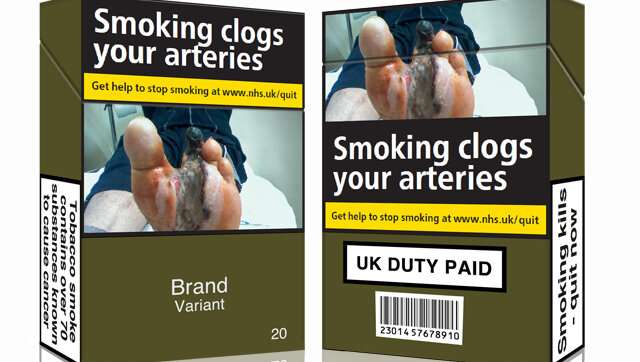Tobacco giants still marketing cigarettes despite plain packaging legislation


Fresh evidence has revealed that major tobacco companies in the UK have made attempts to continue to market their products despite the introduction of plain packaging for cigarettes nearly three years ago.
The plain packaging policy was designed to rid tobacco companies of their last remaining method for tobacco advertising. No branded packets could be printed from May 20 2016 and all cigarettes and roll-your-own tobacco had to be in plain packaging by May 20 2017. This year-long period was known as the sell-through.
Yet the latest findings from the Tobacco Control Research Group at the University of Bath, published today in the British Medical Journal BMJ Open find that tobacco companies deployed a variety of tactics to get around technicalities in plain packaging legislation.
Their study, funded by Cancer Research UK, suggests companies:
- Made product name changes that smokers would relate to the old branded packs. For example, flavour names previously associated with low tar cigarettes (e.g. ‘smooth’) were changed to colour names (e.g. blue). These colours often replicated the colour of the branded packs. The researchers suggest this facilitated continued misperceptions about the relative harms of products. Research evidence has conclusively shown that ‘low tar’, ‘smooth’, ‘mild’ or ‘light’ cigarettes are no less harmful than their full-strength counterparts despite what smokers might think.
- Used a lengthy ‘sell-through’ period to their advantage by offering retailers financial incentives to keep branded packs on the market for as long as possible and by using the time to communicate all forthcoming changes to product names.
- Introduced features to cheaper brands that are usually confined to more expensive brands due to concerns about smokers down-trading to cheaper brands. For example, several flavour capsule variants such as menthol crush balls were introduced in lower price brackets (these will be banned from 2020). Worryingly, flavour capsule cigarettes have been found to appeal more to non-smokers and non-daily smokers than daily smokers. The availability of such products at more affordable prices may entice those who would not otherwise smoke to do so.
- Offered additional sticks in packs to avoid being ‘constrained’ by a minimum pack size of 20 and trying to tempt smokers to their cheaper brands.
Additionally, cigarette filters, roll-your-own tobacco accessories, cellophane and paper multipack outers, cigars and pipe tobacco were exempt from the legislation and therefore, tobacco companies have increasingly focused their attention on innovating and marketing these products to retailers. The marketing of filter innovations such as ‘improved filter, ‘firm filter’ appears to have the same aim as replacing flavour names with colours, hinting at a potentially reduced risk experience.
Philip Morris International introduced changes to its Marlboro brand, adding bevelled edges, and a new closing mechanism to the packet that endured after the legislation was fully implemented. The researchers suggest this was to make their product appear more premium and recognisable compared to other brands.
The study reviewed data from several sources—retail, trade and industry reports, articles and adverts; routine tobacco pack purchases and commercial tobacco sales data—to explore what changes tobacco companies made to their brand portfolios, product names, pack branding and pack sizes in light of the new legislation.
Lead author, Dr. Karen Evans-Reeves from the University of Bath’s Department for Health, explains: “Although compliance with removing branded packs was generally good, the study revealed that tobacco companies engaged in activities that undermined and continues to undermine the legislation.
“Major tobacco companies will always try to find a way to market their products. Based on the number of innovations we found in this study, we would encourage all governments considering implementing plain packaging legislation to consider how tobacco companies have adapted to the legislation in other countries and where possible, close any remaining loopholes.”
Source: Read Full Article




